Dr. Blake Perry’s Path from Cockpit to Clinic in Nicaragua
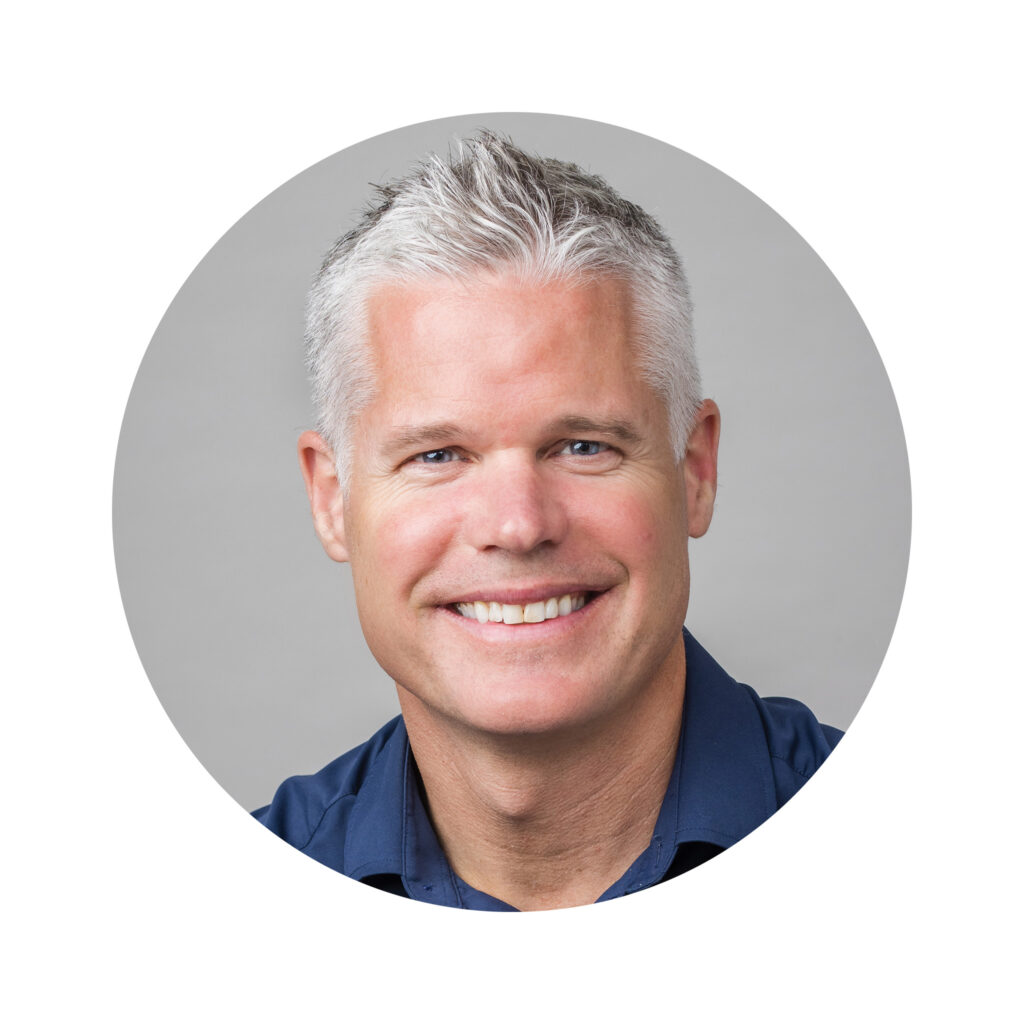
Dr. Blake Perry
There is a line of locals waiting patiently to be seen at The Nancy Lund Clinic. Many have walked, some for miles, often barefoot, to receive free dental care.
The building is divided into thirds. One-third is set for a dental clinic, and the other two-thirds is the waiting room. This small, unassuming building sits near the beach of Aposentillo in northern Nicaragua.
Patients wait for free dental services provided by Dr. Blake Perry, a dentist from Mount Vernon, Washington, who has served this Nicaraguan community since 2016. His team includes his wife, Shannon, and consists of a mix of volunteers, some from his dental office back home and others from the local area, including a local dentist and nurses. Shannon manages the logistics of getting the supplies and people in place.
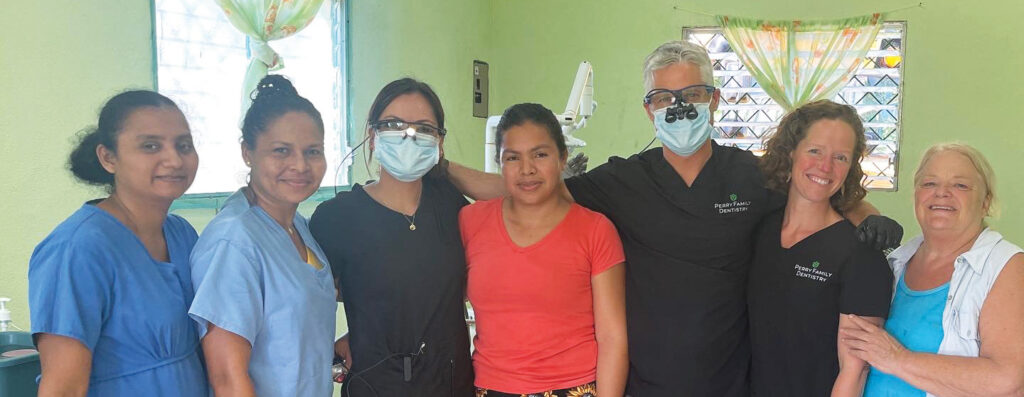
The team poses with a patient: L to R: Nurse Milagros Narvaez, Nurse Jazmina Mendez, assistant Giselle Hollaus, patient, Dr. Blake Perry, logistics manager, Shannon Perry, and clinic director Margaret ‘Margarita’ Boren.
Dentistry wasn’t always the plan for Dr. Perry, who returns 2 or 3 times a year to provide dental care to this area. Perry actually learned to fly planes while in dental school, inspired by his uncle, who was a pilot. He was restless in dental school and wasn’t sure he wanted to be a dentist, but discovered he had a natural talent for it. He decided to join the Air National Guard, allowing him to pursue his love of flying and dentistry simultaneously.
He completed dental school, became board-certified, and then underwent pilot training at Laughlin Air Force Base in Texas. For a period, he was both a dentist and a pilot, sometimes volunteering as a dentist while serving in the Guard.
After graduating from the University of Iowa College of Dentistry, he joined the pilot training program with the Wisconsin Air National Guard. He served in air sovereignty alert and training missions as a combat-qualified F-16 wingman.
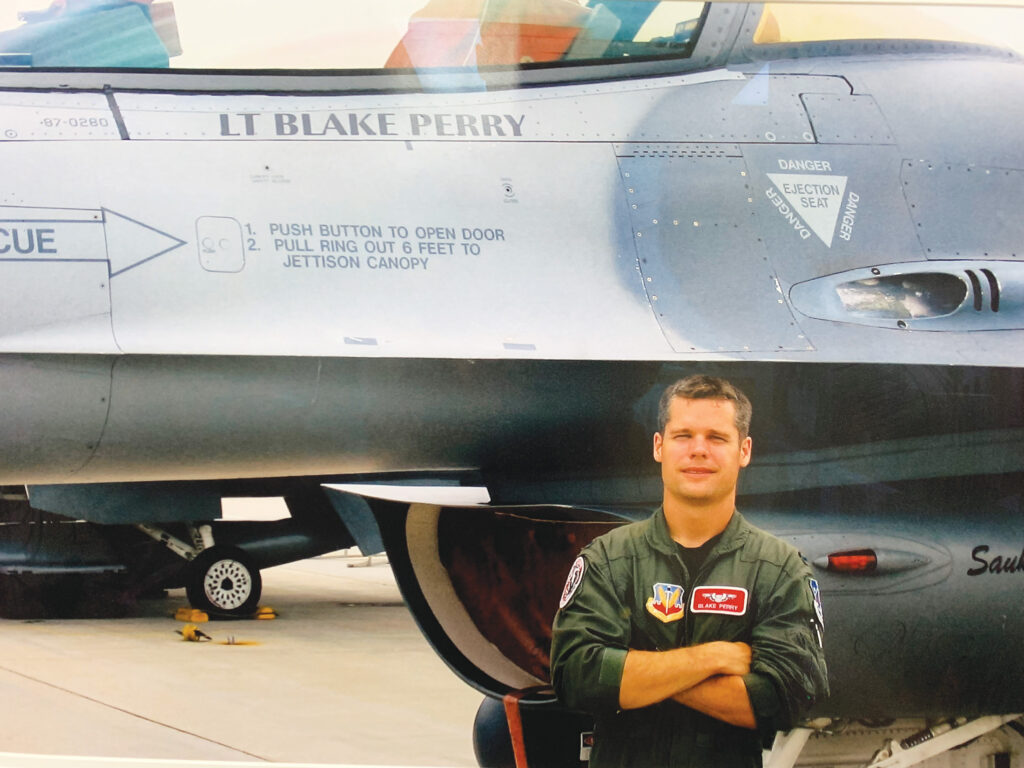
Lieutenant Perry in his fighter pilot days. |
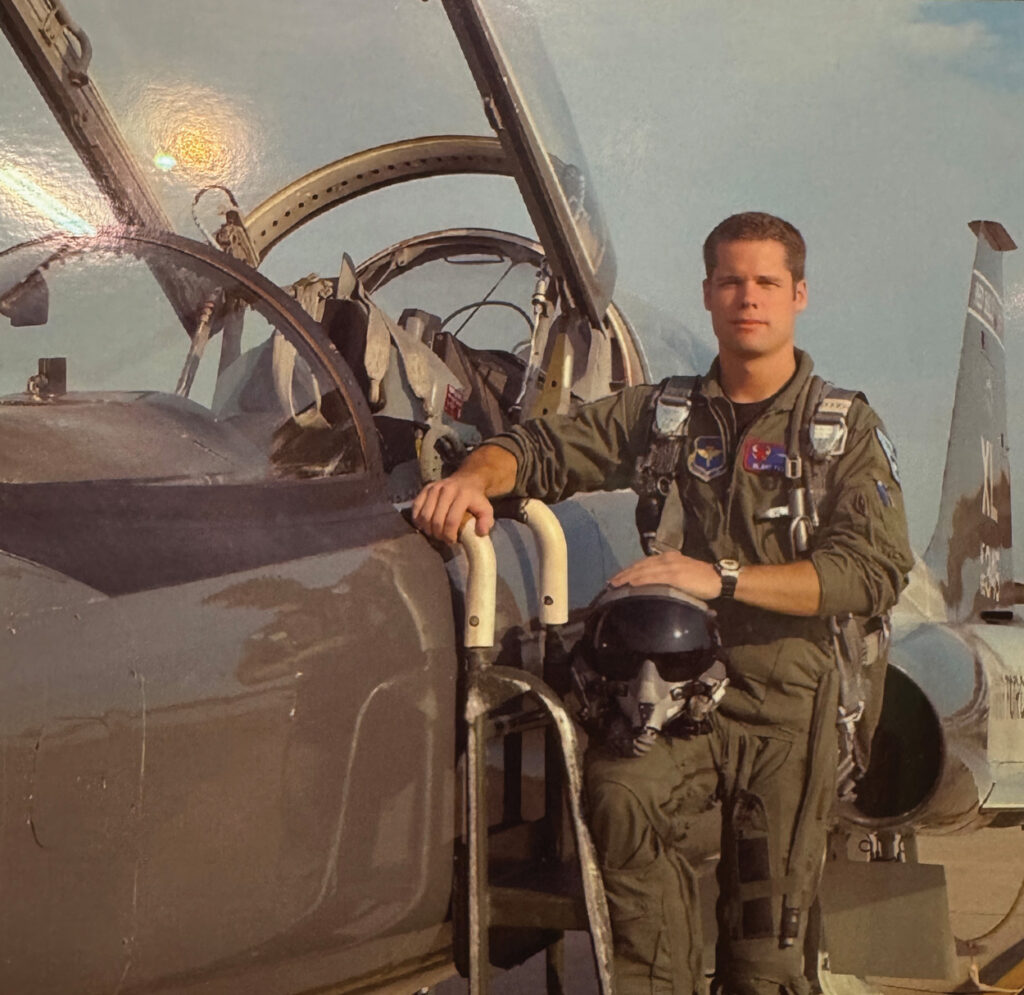 |
|---|
After his time in the Air Force, he became an associate dentist, pursued further training, and eventually bought his own dental practice. He credits mentors and colleagues for helping him transition into full-time dentistry after his flying career.
Dr. Perry found that he had a purpose and a calling in dentistry, and he found the lifestyle more appealing. Facing a post-military career in aviation, he realized that dentistry brought more job security, and a better work-life balance than an eventual career as an airline pilot, which often involved layoffs and unpredictable schedules.
But more than that, he appreciated the direct impact he could have on people’s lives as a dentist, combining leadership and service in a way that resonated with him.
Skills from his pilot career, such as resilience, adaptability, and technical proficiency, transferred well to dentistry.
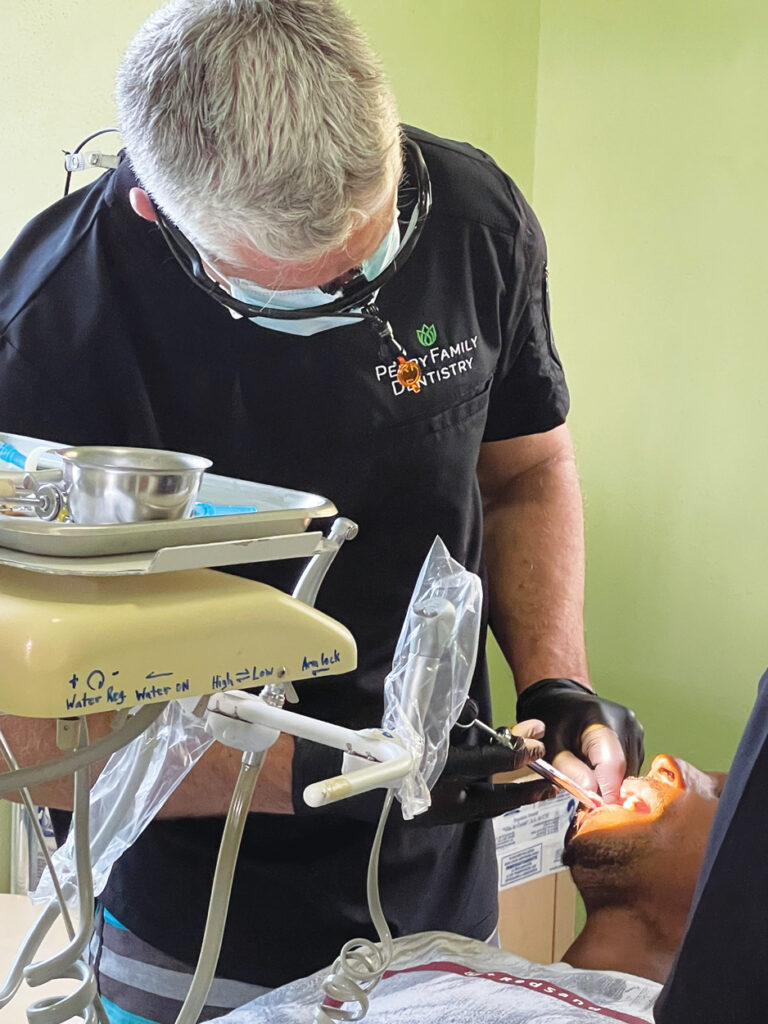
The Nancy Lund Clinic serves the community in Chinandega, in the Northwestern region of Nicaragua.
He valued the broader perspective and stress management skills he gained as a pilot, which helped him relate to patients and handle the demands of dental practice.
In 2014, Dr. Perry and his wife were looking for a surfing vacation. His hygienist, Carlos, a Nicaraguan refugee from the war who became a hygienist in the Navy, suggested that Dr. Perry visit Nicaragua. Carlos’s suggestion led them to visit, and on that trip, they fell in love with the area and the people.
When Dr. Perry realized the nearest dental office was over an hour drive and most people couldn’t afford basic dental care, let alone transportation, he knew he had the skills and resources to make a difference.
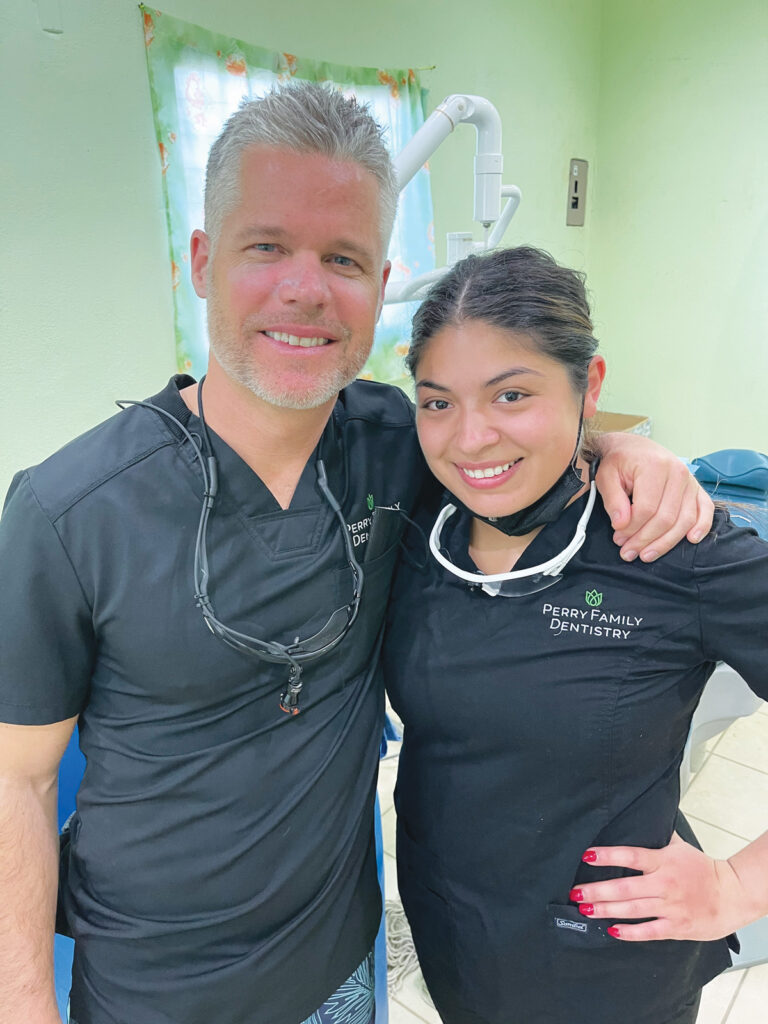
Dr. Perry with dental assistant Gracie Garcia
They connected with Circle of Empowerment, a non-profit organization, which led them to the local medical clinic. Over time, they began volunteering, providing dental care, resources, and education, and even built a house there, returning regularly to support the clinic and community.
“So it’s pretty tough to just get regular care, but they’re still happy. It really changes your perspective and helps you really enjoy the profession and appreciate how we can serve at just the smallest level, and so I think that’s the most rewarding thing for me.”
Providing dental care in this remote region of Nicaragua comes with a host of challenges. The salty air near the coast quickly degrades equipment, especially the curing light batteries. Transportation is another major hurdle; many patients can’t get to the clinic by themselves.
To bridge that gap, local nurses travel to surrounding villages, using their community connections to spread the word. The first day is usually quiet, but once news gets out, patients begin arriving in waves.
Supplies are often limited, especially toward the end of each trip, since it’s impossible to predict what kinds of cases will come through the door. Early on, before he was able to bring handheld X-ray units, Dr. Perry relied heavily on physical exams, sometimes having to resort to simply tapping teeth and asking through a translator, “Does this hurt?”
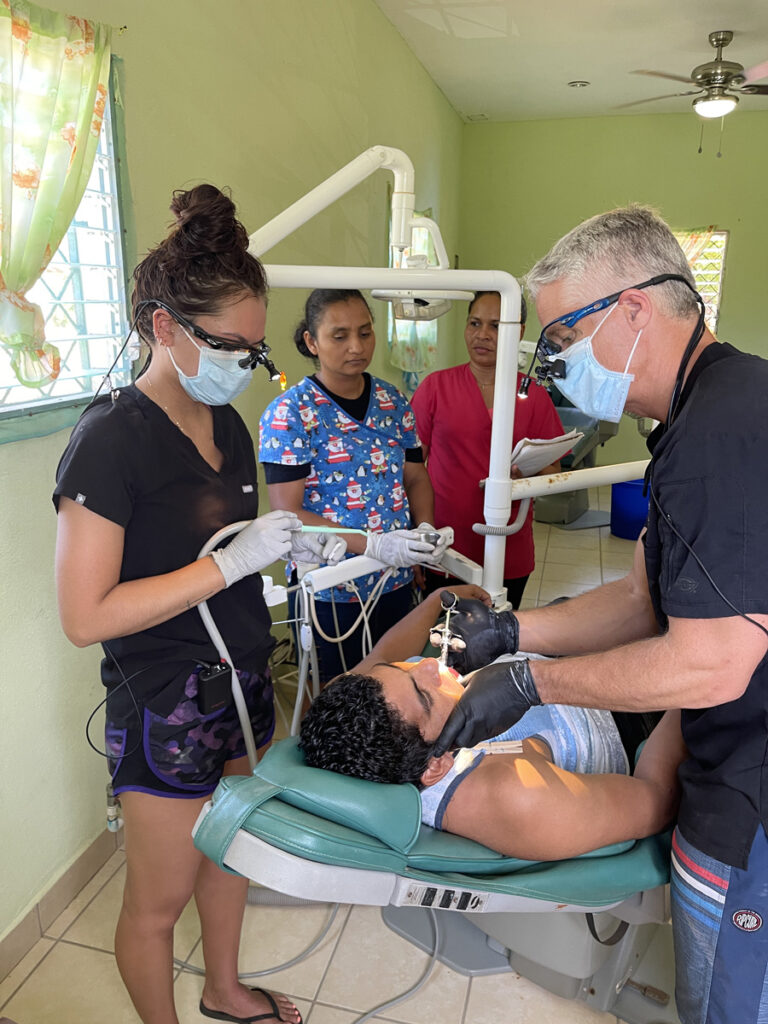
Dr. Perry and assistant Giselle Hollaus work on a patient
Burkhart has supported Dr. Perry’s trips, donating free supplies like toothbrushes to giveaway.
He emphasizes that the education they can provide on basic hygiene is almost as important as the dental service being provided.
“If you teach someone how to brush and floss…give them a few tips, and a tube of toothpaste…that will actually pay dividends for their entire life.”
He mentions this as one of the resources they can provide to keep people coming back to see the nurses at the non-profit between his trips.
Import restrictions make it difficult to bring in equipment, and the team is actively working on securing customs approvals to ease that burden. Space is also a concern. There aren’t always enough rooms for patients to be seen by nurses, who are also part of the local non-profit and are focused on education and healthcare. They run a school bus to ensure children can attend school and raise funds to send women from the community to nursing school. Many of those trained nurses return to work locally, some even teaching English or practicing traditional Nicaraguan healing methods.
On average, the team sees 10 to 15 patients a day. When more providers are available, that number increases. On one trip, nurses were trained to apply silver diamine fluoride, allowing Dr. Perry to quickly examine children and direct treatment. This kind of teamwork and improvisation helps the team reach more people, especially when extractions or complex procedures aren’t required.
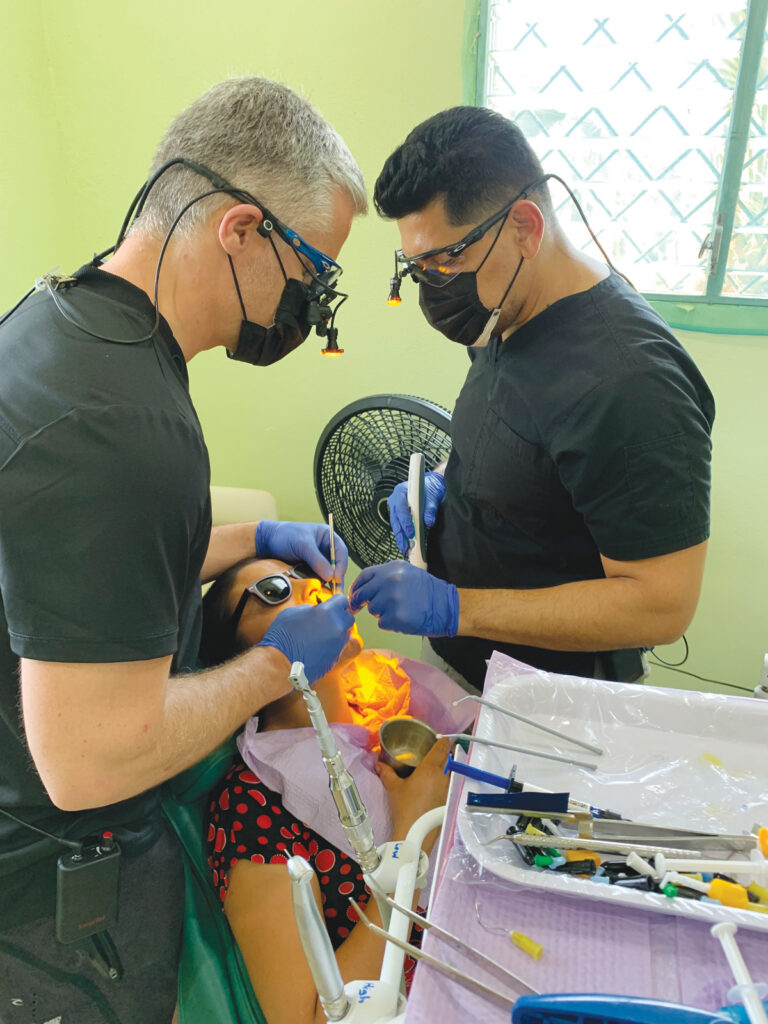
Dental hygienist Carlos Valverde, the one who suggested the first trip to Nicaragua.
Perry and his team use their resources to do whatever they can, whether it’s triage-type dental medicine, preventative medicine, or restorative dentistry. Margaret Boren, the director of the clinic, plans to retire in 5 years or so, and the clinic’s future is unknown. But Dr. Perry plans to continue.
“There’s more than enough work to be done. There’s more work than we can possibly do. [We want to] build coalitions in the community with the new generation, and hopefully get a dental clinic there that continues, because people can’t afford dentistry. They don’t have the resources.”
Dr. Perry also volunteers his time closer to home, offering free dentistry to domestic violence survivors with the AACD (American Academy of Cosmetic Dentistry). He is also involved with The Kois Center for Dental Excellence in Seattle, WA, and CEREC Doctors Education in Scottsdale, AZ, as well as much more local philanthropy.
To Dr. Perry, giving back to communities isn’t just a good deed; it’s an experience that enriches both the person and the practice.
“Charity does not have to be a big-time commitment. It can recharge you. Reinvigorate your love for dentistry and the benefits of dentistry. Everybody wins. Your practice wins. Your energy is increased through inspiration.”
Learn more about Perry Family Dentistry. Learn more about the clinic in Nicaragua.
Written by Dawn Kahl.
Published in Catalyst – Q4 2025.
Category: Giving Back
Back to Articles